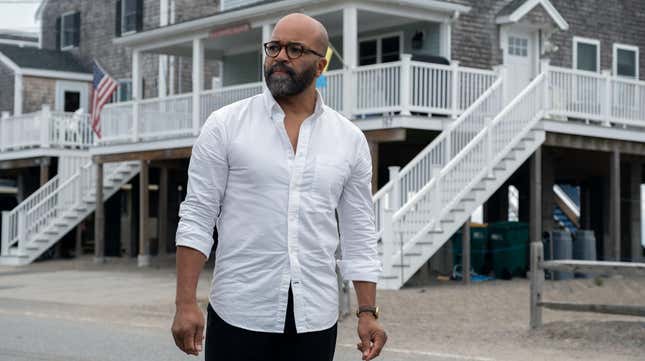
Jeffrey Wright is a busy guy. 2023 saw him in the biographical drama Rustin, the kitschy Wes Anderson film Asteroid City, and now the satirical American Fiction. These films come on the heels of the Robert Pattinson-led The Batman and a starring role in Westworld. “I balanced them with a lot of airline miles,” Wright joked during our recent conversation. “I’ve bounced around a bit from set to set over the last several years and I’ve worked with pretty generous filmmakers … and I’m glad that period is over. I don’t think it’s necessarily great to overlap work in that way.”
It’s safe to say that Wright’s focus now is on American Fiction, which earned him a Golden Globe nomination this week and is poised to attract further nods as award season continues. Wright stars as Thelonious “Monk” Ellison, a novelist who “writes in a way that is intellectually free,” as the actor puts it. His high-minded ideals have hardly brought fame or fortune though, so in a moment of frustration he decides to prank the publishing industry with an über-gritty, highly stereotypical novel about Black American life. What follows is a skewering of pop culture at large, and a comic look at what kind of Black voices white gatekeepers want to hear.
American Fiction unites Wright with writer and director Cord Jefferson, who makes his feature debut with the film. Though based on Percival Everett’s 2001 novel Erasure, the film feels especially timely in its discussion of the types of Black trauma and grief that make it to our screens. Monk is “dealing with the trauma also known as life,” as Wright says. The character’s ironic success comes as he deals with stressors that are universal, if not as immediately attention grabbing: aging parents and fracturing relationships with loved ones.
“I don’t think there’s been such an overlap for me between my life and a character,” Wright shares, excepting perhaps his portrayal of Jean-Michel Basquiat in the 1996 biopic Basquiat, his first starring role in a film. “I knew what it was like to be a young, reasonably creative guy in the wilds of the Lower East Side back in the ’80s when I moved here.” Wright found success in theater first, winning a Tony in 1994 for his role in Angels In America. An Emmy followed in 2004 when Wright reprised the role in an HBO miniseries, and the next two decades saw the actor in a filmography as varied as they come. “I’ve stayed busy and I think that has something to do with being flexible,” he says.
But it’s the role of Monk that has the most parallels to Basquiat, at least in terms of what they mean to their performer. “This role is kind of a bookend to that. I’m no longer as young as that guy who was running free on the Lower East Side,” Wright muses. “You reach a certain stage in your age in which we’re asked to be the caretaker of those who took care of us. The film is very much about transition where your family turns to you, almost as collective, and asks you to be the adult in the room. I think Cord Jefferson and I had experience that not too long before getting involved in this project.”
Wright’s own family has long informed what he does and how he conducts his career. “When my kids were young it was, well, I don’t wanna go away from home for too long. I would rather be away for three weeks or two weeks and play a supporting role than be away for six months and play a lead role,” he shares. “And so I’d take the money and go back to the kids.” But now that the kids are older, Wright is globe-trotting again, in Boston for American Fiction, London for The Batman, Spain for Asteroid City.
The collaborations with Wes Anderson are particularly rewarding for Wright. “I didn’t even know he had seen practically every play that I’d ever done in New York. And I was like, dude, you didn’t come backstage and say hello,” the actor quips. But if Anderson didn’t come with greetings, he came with a part written just for Wright in The French Dispatch. “I read it and it was just one of the most beautiful pieces of dramatic writing that I had ever read. The first time I read it, it just imprinted itself in my head.”
Wright is also is eager to heap praise on other writers. Matt Reeves, for example, won over Wright for The Batman with the strength of his writing. “I think I was really pleased when I read the script, because I thought Matt’s vision was one that appealed to my sensibilities,” he says. “I love the idea of this being a Gotham and a Batman that we could actually get our hands around and touch.” Though Wright isn’t in the upcoming Penguin series (yet), it seems a safe bet that Commissioner Gordon will be in an upcoming Batman sequel. “I only know that Matt’s off somewhere in his Batcave writing away. I’m very excited at some point to see what the deal is.”
With such a varied career, Wright is a pro at knowing what to find in these roles. “It’s the words and the people,” he says. “Pretty simple recipe.” It’s clear in talking to him that he really did find both of these things in American Fiction; his praise for his castmates, including Sterling K. Brown, Tracee Ellis Ross, Leslie Uggams, and Issa Rae is as effusive as his raves for Jefferson. Wright recalls pride on set both from those in front of and behind the camera. “There was a good feeling on this film. You could feel that kind of momentum as we were working on it,” he says. “You get that on occasion on sets that you’re doing something that might be pretty good. It might be special.”